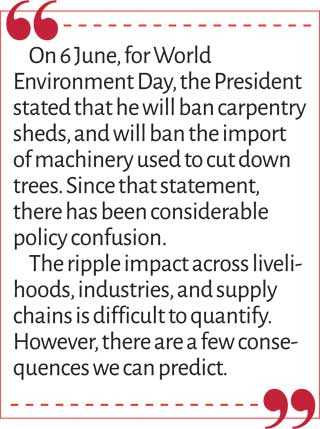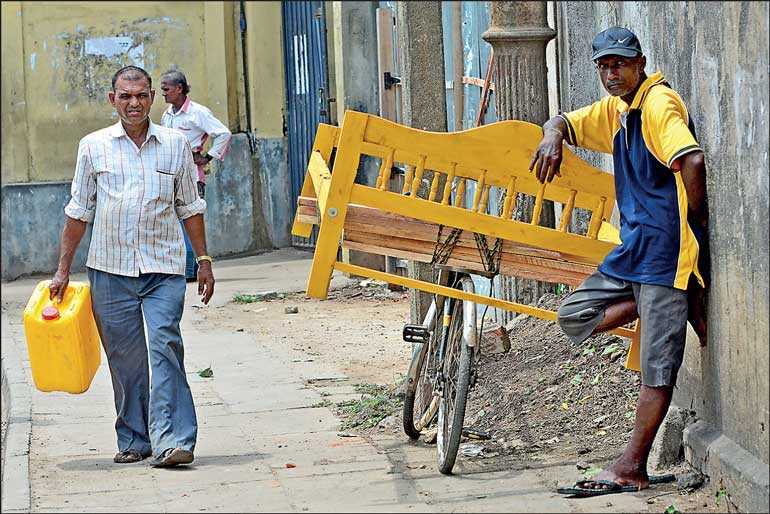Axe-ing local carpenters
The banning of carpentry sheds will reduce the furniture supply in the market, pushing prices of wooden furniture up. The hike in prices will mean that sales drop, pushing carpenters out of the industry – Pic by Shehan Gunasekara
 Friday, 28 June 2019
Friday, 28 June 2019 On 6 June, for World Environment Day, the President stated that he will ban carpentry sheds, and will ban the import of machinery used to cut down trees. Since that statement, there has been considerable policy confusion. It is unclear whether the Gazette notification was amended to ban carpentry sheds and these saws, or whether given public outcry, the ban was not implemented.
However, this is still a matter worth discussing. Even if the Gazette is not amended, a precedent has been set for people in positions of power to take misguided decisions, which could affect the livelihoods of thousands of people. In this instance, the intent of this decision is to address problems of deforestation - the question is, will it achieve this goal?
 In Grade 8, we were taught the negative impacts of disturbing the equilibrium in a system or an ecosystem. That should be the first lesson for all leaders in Sri Lanka, before they even think of the word “policy”. To date, I recall the story of my Science teacher. In a forest where deer and lions coexisted, the then-ruler realised that deer were the prey for lions - a situation the king felt was unfair. As a result, the king made a royal decree that all lions in the forest should be killed, in order to protect the deer. For a few years, this appeared to be a wonderful decision. However, a few years later, the absence of a predator resulted in a sharp increase in the deer population. As a result, the food sources in the forest were not adequate to sustain this unprecedented boom in population, and the deer had to resort to eating the barks of trees. Overtime, the damage to tree barks affected the overall health of the forest, as trees began to wither and die. The increased scarcity of food meant that the deer population did not have enough sustenance to survive. In simple words, the good intention of protecting the deer population ended up in the collapse of an entire ecosystem.
In Grade 8, we were taught the negative impacts of disturbing the equilibrium in a system or an ecosystem. That should be the first lesson for all leaders in Sri Lanka, before they even think of the word “policy”. To date, I recall the story of my Science teacher. In a forest where deer and lions coexisted, the then-ruler realised that deer were the prey for lions - a situation the king felt was unfair. As a result, the king made a royal decree that all lions in the forest should be killed, in order to protect the deer. For a few years, this appeared to be a wonderful decision. However, a few years later, the absence of a predator resulted in a sharp increase in the deer population. As a result, the food sources in the forest were not adequate to sustain this unprecedented boom in population, and the deer had to resort to eating the barks of trees. Overtime, the damage to tree barks affected the overall health of the forest, as trees began to wither and die. The increased scarcity of food meant that the deer population did not have enough sustenance to survive. In simple words, the good intention of protecting the deer population ended up in the collapse of an entire ecosystem.Undoubtedly, the policy decision to ban carpentry shops will have a similar situation. The ripple impact across livelihoods, industries, and supply chains is difficult to quantify. However, there are a few consequences we can predict.
Furniture prices are likely to increase
The banning of carpentry sheds will reduce the furniture supply in the market, pushing prices of wooden furniture up. The hike in prices will mean that sales drop, pushing carpenters out of the industry. As the President has halted approvals for new carpentry shops, the industry is effectively condemned to an early death, with no ability for new players to enter, and no incentives for current players to expand in the industry.
Incentivising deforestation, bribery and corruption
With the prices of wooden furniture skyrocketing, the President has created a situation where any industrious, entrepreneurial minded individual would want to enter this industry. However, as permits for new carpentry shops have been halted, there is no legal path for people to enter the industry. The incentives are then for these people to enter the industry illegally, using bribery as their entry ticket. The consequences of illegal logging and unregistered chainsaws are much larger than those of allowing this industry to function within a regulatory system. The Government will not be able to monitor or regulate the levels of deforestation in the country, and we are likely to witness an increase in loss of forest cover.
Lack of innovation and unemployment across sectors
 These new restrictions placed on the carpentry industry provide no incentives for people to innovate within the industry. New, affordable and effective ideas which would aid environmental protection are unlikely to come about. Other countries have experimented with private forests, industrial timber cultivation and development of equipment to minimise wastage and enhances productivity. This will not be the case in Sri Lanka. The impact will not be limited to carpenters. No industry exists in a bubble, it is supported by a myriad of ancillary industries which will all be affected. Transportation, painting, polishing, varnishing, wood carving, cushioning, housing, construction are just a few examples of industries which will be affected by rising costs of furniture.
These new restrictions placed on the carpentry industry provide no incentives for people to innovate within the industry. New, affordable and effective ideas which would aid environmental protection are unlikely to come about. Other countries have experimented with private forests, industrial timber cultivation and development of equipment to minimise wastage and enhances productivity. This will not be the case in Sri Lanka. The impact will not be limited to carpenters. No industry exists in a bubble, it is supported by a myriad of ancillary industries which will all be affected. Transportation, painting, polishing, varnishing, wood carving, cushioning, housing, construction are just a few examples of industries which will be affected by rising costs of furniture.Possible solutions
At present the import tax on furniture is 88%, pricing imported furniture out of reach of the majority of the population. With no alternative, people turn to locally produced furniture. It is unlikely that the carpentry industry is the driving force behind all deforestation problems in the country - but even if it were - a more effective policy reform would be to lower these taxes. If imported furniture was more affordable, consumers would change their preferences and demand for locally produced furniture and the logging behind this industry would fall.
The current tax of 88% on furniture imports is difficult to justify. If the Government is concerned about the environment, it should be able to put aside its protectionist agenda for a decrease in the rates of deforestation. That no steps have been taken in this direction indicates that their motives may not be as clear as we thought.
Bringing down taxes on semi-products and finished furniture products is vital to improving consumer choice and competition in the furniture market. This would encourage new entrants to the industry, and the increase in competition would mean that there are more incentives for people to develop environmentally friendly business models.
Dhananath Fernando is the Chief Operating Officer of the Advocata Institute and can be contacted at dhananath@advocata.org. Advocata is an independent policy think tank based in Colombo, Sri Lanka. They conduct research, provide commentary and hold events to promote sound policy ideas compatible with a free society in Sri Lanka.

